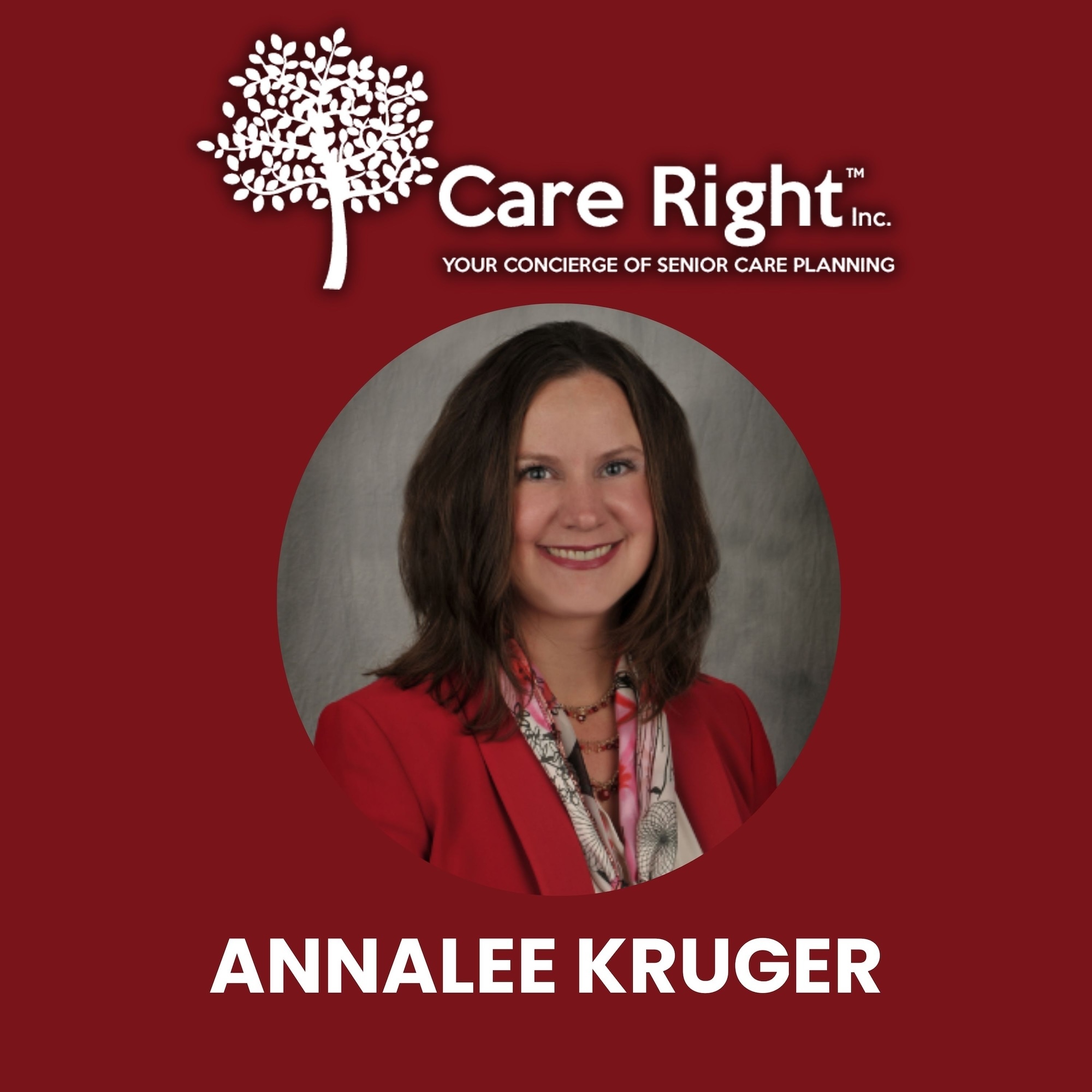
608
Downloads
98
Episodes
Family caregivers across the nation are finding themselves thrust into the role of caring for aging loved ones without ever having any family discussion about the ”what is” of aging. Families are not talking about care needs, caregiver burnout, the costs of care, dementia, other disease progressions, and they aren’t putting proactive plans in place. If you find yourself in this predicament, you need to listen to our ”Tired” podcast series
Episodes
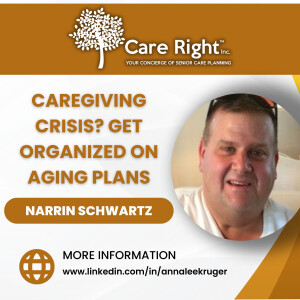
Friday Jul 26, 2024
Caregiving Crisis? Get Organized on Aging Plans with Narrin Schwartz
Friday Jul 26, 2024
Friday Jul 26, 2024
Quotes:
- "Clients expect your service. So I take it to another level, going above and beyond.”
- "I've spent years developing relationships so that when I refer someone to my referral partner, they know to pick up the phone because it is really, really, really important.”
- "I help put time back into one's life, which is purely priceless."
Takeaways:
- Develop a customized aging plan for your parents now before a crisis happens. Consider your family's goals and your parents' needs and preferences.
- Research senior care services in your area like concierge programs, care managers, and home health agencies to create a support team.
- Calculate your current caregiving time commitment and costs. How much is your time worth? Consider professional help to save money and reduce stress long-term.
- Ask yourself tough questions - is your current situation sustainable? How will medical crises or changes in your parents' health be handled from a distance?
Conclusion:
Resources:
Guest Links:
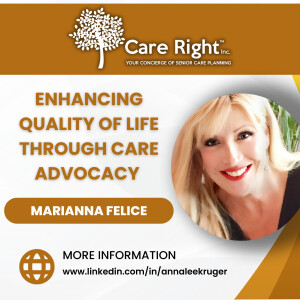
Thursday Jul 25, 2024
Thursday Jul 25, 2024
Quotes:
- "Many times, I've been asked if I'm a family member because of the bond I develop with my clients." – Marianna Felice
- "You don't have to be a nurse to know when something's wrong; advocates play a key role in identifying and addressing these issues." – Annalee Kruger
- "It's a fight to get quality care sometimes, and having an advocate ensures that residents' needs are continuously addressed." – Annalee Kruger
Takeaways:
- Regular, bi-weekly visits by patient advocates are crucial in identifying and addressing care issues that may be overlooked by facility staff.
- Staff shortages and high turnover rates in care communities often lead to compromised care, making the role of advocates even more essential.
- Advocates provide a critical oversight function, ensuring that medical issues are promptly and correctly addressed, thereby improving residents' quality of life.
- Family members of residents can benefit from the support of patient advocates, who can attend care conferences and follow up on necessary actions, relieving families of constant worry.
- The presence of a dedicated advocate can significantly enhance the care experience for residents, ensuring they are treated with dignity and respect.
Conclusion:
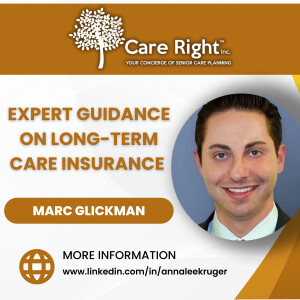
Thursday Jul 25, 2024
Expert Guidance on Long-Term Care Insurance with Marc Glickman from Buddy Insurance
Thursday Jul 25, 2024
Thursday Jul 25, 2024
Quotes:
- "It takes a village to take care of a loved one. Having a financial and emotional process in place is crucial." – Marc Glickman
- "Half of the battle is getting your plan in place. It's not just about buying an insurance product, it's about having a comprehensive strategy." – Marc Glickman
- "Educating families about long-term care policies is essential to prevent the financial burden of caregiving." – Annalee Kruger
Takeaways:
- Start planning for long-term care as early as possible to secure better coverage and lower costs.
- Involve family members in discussions about long-term care plans and insurance policies to ensure everyone is informed and prepared.
- Understand the triggers and benefits of your long-term care insurance policy to avoid common pitfalls such as lapses and denied claims.
- Utilize the expertise of long-term care specialists and financial planners to navigate the complexities of long-term care insurance.
- Leverage the flexibility of long-term care insurance policies to supplement caregiving support and reduce the burden on family members.
Conclusion:
Resources:
Guest Links:
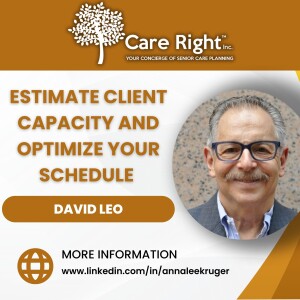
Wednesday Jul 24, 2024
Estimate Client Capacity and Optimize Your Schedule with David Leo
Wednesday Jul 24, 2024
Wednesday Jul 24, 2024
Are you a financial advisor struggling to balance deep client care with business growth? Do your clients' complex family situations and aging concerns fall through the cracks due to lack of time and specialization? Balancing deep client care with business growth can indeed be challenging for financial advisors. The key is to leverage technology for efficiency, allowing more time for personalized client interactions. Streamlining routine tasks and focusing on building strong relationships can also help maintain high-quality client care while still driving growth.
David Leo is a renowned practice management coach for financial advisors. With over 20 years of experience consulting for top firms like IBM, Paine Webber, and UBS, David uniquely helps advisors optimize their businesses and maximize client outcomes. On this episode, Annalee and David discuss strategies that financial advisors can use to optimize their practices, deepen client care, incorporate elder planning services, and grow their businesses successfully over time through structured processes, business development techniques, and continuous learning. Stay tuned!
Quotes:
- "To be a successful financial adviser, it's about caring for and about your clients and their families, as well as having technical competence.”
- "The real curiosity is something I enjoy: learning about people and discovering what drives them.”
- "There's nothing worse than trying to put ten pounds of stuff in a five-pound suitcase. It just can't be done. You need a bigger suitcase."
Takeaways:
- Develop a visual model or "show and tell" of your services to uncover clients' full range of needs during discovery meetings. Use this to differentiate yourself and build stronger relationships.
- Analyze your current client roster and estimate the time spent with each client to create an ideal service model. Use this to optimize your schedule and determine your capacity.
- Block out dedicated time each day for client meetings, business development activities, and other key tasks.
- Protect this time to maximize productivity.
- Consider specializing in an underserved niche like elder planning to distinguish your practice and attract new clients. Stay on top of issues affecting aging populations.
Conclusion:
Financial advisors can grow their businesses by building strong client relationships, offering tailored advice, and staying updated on market trends. By prioritizing client needs, continuously improving their knowledge, and utilizing effective marketing strategies, advisors can achieve lasting success and client trust.
Resources:
Guest Links:
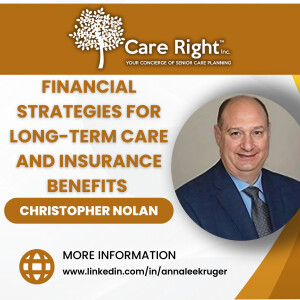
Wednesday Jul 24, 2024
Wednesday Jul 24, 2024
Quotes:
- "There are always options, but the earlier you plan, the better your options will be." – Christopher Nolan
- “It's just like anything in life, the more resources and money you have, the more options you have, right? So, the better you plan now, the more options you'll have later.” – Christopher Nolan
- "If you don't have a plan, the state has one for you, and unfortunately, it's not a very good one." – Christopher Nolan
Takeaways:
- Plan for long-term care as early as possible in life to keep costs down and avoid relying on Medicare and Medicaid, which don't cover everything.
- As an investment in your future security, consider getting long-term care insurance to cover costs associated with nursing homes, assisted living, and home care.
- Families should talk openly about getting older and long-term care preferences so everyone is on the same page and ready.
- Talk to a professional about your long-term care options to make smart choices and avoid financial stress caused by not planning ahead.
Conclusion:
Resources:
Guest Links:

Tuesday Jul 23, 2024
Choosing the Right Medicare Plan for Changing Health Needs with David Klaus
Tuesday Jul 23, 2024
Tuesday Jul 23, 2024
Quotes:
- "Health insurance and health care are one of the biggest risks that we all face. We want to make sure we have good comprehensive coverage as much as possible.”
- "Those who spend more time evaluating those options upfront and throughout the years are going to end up saving a lot of money and getting more peace of mind that their health insurance options are chosen wisely.”
- "You want to focus on family and health, and health recovery is the best that you can bear."
Takeaways:
- Evaluate your current Medicare plan and consider if a switch could provide better coverage as your health needs change over time. Ask an expert like David to review your options.
- Consider how provider networks may impact future care needs if moving or requiring skilled nursing. An advisor can help analyze network flexibility within different plan types.
- If caring for aging parents, assess their ability to make ongoing Medicare decisions independently. Seek help from advisors if signs of confusion or frequent plan changes appear.
- Schedule time with a licensed Medicare advisor to review enrollment windows, components of Medicare, and potential cost-savings programs available based on your individual situation.
Conclusion:
Resources:
Guest Links:
David's Facebook
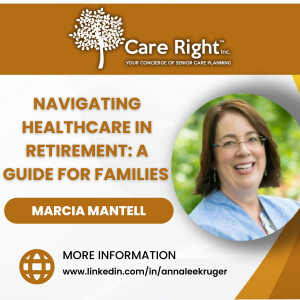
Tuesday Jul 23, 2024
Navigating Healthcare in Retirement: A Guide for Families with Marcia Mantell
Tuesday Jul 23, 2024
Tuesday Jul 23, 2024
Quotes:
- "We have no reason to know that once we're getting into retirement, nothing that we've been doing for the last 40 or 45 years applies any longer. We are now, completely and literally, talking about and being shoved off a cliff into the great blue ocean below."
- "If you don't get those right, you have long-term problems—different long-term problems in addition to aging. We want to help you avoid making some of those big mistakes or misunderstandings that are floating around out there."
- "This interconnectivity just carries through in ways that we would have no way of knowing. These things are connected."
Takeaways:
- Research your Medicare and prescription drug options starting at age 60 using Medicare's Plan Finder tool. Put in your medications to understand costs..
- Beware of incomplete information in Medicare Advantage plan advertisements. Do your research on costs and coverage details before enrolling.
- Ask your financial advisor if they are well-versed in Medicare rules and how programs intersect. Seek guidance from an expert if needed.
- Consider your insurance needs if relocating or experiencing major health changes. Research provider networks for facilities in the new location.
Conclusion:
Resources:
Guest Links:
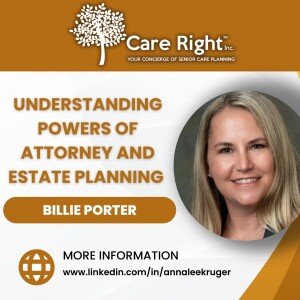
Monday Jul 22, 2024
Monday Jul 22, 2024
Feeling overwhelmed about managing your aging parent's finances or medical needs? You're not alone. Elder care planning is crucial but can be daunting. Open communication and careful organization are key. Check financial accounts regularly, set up a password system, and ensure you have a power of attorney document to prevent elder financial abuse. Act now to protect your family's future and peace of mind!
Meet Billie Porter, a trust officer and certified financial planner at FineMark National Bank and Trust. With 18 years of experience in the financial industry, Billie will share her invaluable guidance on establishing the right foundations, from ensuring trusted contacts to requesting annual account reviews. Learn her top tips for streamlining responsibilities through proactive planning. Discover the simple steps you can take today to feel confident and prepared for whatever may come.
Quotes:
- "I encourage you to talk with your kids to see who's willing, ready, and able to act and who isn't going to be upset that your child number one is named over child number two.”
- "The power of attorney is a very powerful document. But in other states, they’re actually springing powers, or they’re not available to use until that person who made them is actually incapacitated and unable to make their own decisions."
- “Remember, it's not automatic. So make sure you talk to each financial institution and try to get the powerful document to them as soon as possible. Even proactively, some institutions will accept it ahead of time so that they know who to talk to if something happens.”
Takeaways:
- Ensure you have the proper legal documents, such as powers of attorney and medical directives, and that they are reviewed regularly.
- Communicate clearly with family members about your plans and wishes for end-of-life care and financial decision-making.
- Work proactively with financial institutions to ensure smooth transitions of responsibilities and access during incapacity events.
Conclusion:
Being proactive in planning and communicating about essential documents like powers of attorney, wills, and medical directives is crucial. Families should understand their parents' wishes and financial situation in case of a medical crisis. Having the proper legal documents and communicating with professionals can help ensure a smooth transition if parents become incapacitated. Regularly reviewing plans with parents and professionals can help account for changing needs and relationships over time. Families can best support their aging loved ones with advanced preparation and open communication. Following these steps ensures a stress-less process for you and your family.
Resources:
Guest Links:
Billie's Website
Billie's LinkedIn
Billie's Email: bporter@finemarkbank.com

Monday Jul 22, 2024
Monday Jul 22, 2024
Quotes:
- "You, as an advisor, are in a unique position to ensure that he has enough solutions and care supports at home so that he doesn't prematurely end up in a nursing home just because no one cared enough to make sure they had proper care in place at home." - Anna Lee Kruger
- "People are living longer, which is a great thing. It's something we should all be grateful for because it's a much better place to be. But what we have to think about is how we fund those finances in those later years." - Damien Conway
- "If you truly want to be intergenerational, you need to look after your clients’ parents as well." – Leigh Maynard
Takeaways:
- Educate yourself on aging issues like care costs, care options, Medicaid, and how to budget for a client's longer retirement years. Start addressing these topics proactively with clients.
- Consider how you can build intergenerational relationships within client families and look after parents' finances as well as adult children clients.
- Research products like the immediate care plan that can provide stop-loss protection for clients paying for long-term care. Look for ways to secure clients' ability to afford care costs.
- Facilitate family meetings to identify aging and care needs, determine the best solutions, and ensure adequate financial planning is in place across generations.
Conclusion:
Resources:
Guest Links:

Friday Jul 19, 2024
Effective Family Care Plans and Elder Care Conversations with Carroll Golden
Friday Jul 19, 2024
Friday Jul 19, 2024
Quotes:
- "I know it's a taboo topic. Your grandparents don't want to talk about it, you don't want to talk about it, and your kids have no idea what the impact would be if they didn't talk about it." – Carroll Golden
- "Options begin to close out on you. When you haven't done anything, that's when you go into crisis mode." – Carroll Golden
- "We could all learn together. That's the whole idea behind the care planning team." – Carroll Golden
- "We retire from work, but we don't retire from family." – Carroll Golden
Takeaways:
- Begin conversations about aging and care planning early to avoid rushed decisions under pressure and to have more choices.
- Engage the entire family in the planning process. Utilize tools like a "care squad" and conduct regular "care planning team" meetings to ensure everyone's voice is heard and they feel involved.
- Leverage technology, like video calls, to facilitate family meetings and planning when family members are geographically dispersed.
- Reframing discussions around retirement planning and longevity instead of immediate care needs to create a more positive conversation.
- Collect essential medical and financial information from aging parents respectfully, without making them feel invaded or managed.
- Incorporate considerations of various care options and their costs into the planning process using relevant tools.
